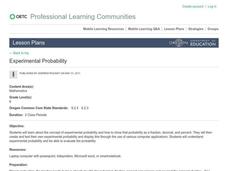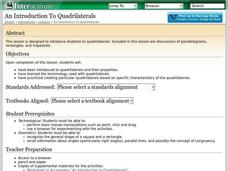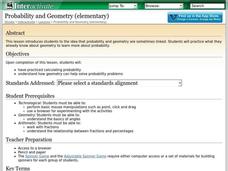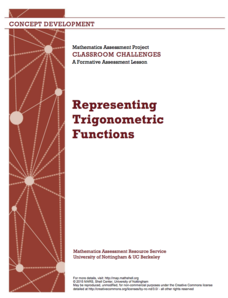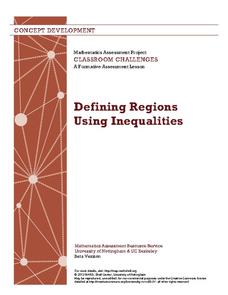Curated OER
Experimental Probability
While just a simple lesson, this activity on experimental probability could provide a way to connect this concept to real life. Learners begin by participating in a probability activity using a coin, and then move on to create their own...
Curated OER
Solving Absolute Value Inequalities
Start this activity with a brief description of how to solve absolute value inequalities. A space is provided to help classify the inequalities into types (greater than, less than, or equal to) and for learners to show how to graph their...
Curated OER
Linear Inequalities in Two Variables
Use this worksheet as a warm up, a refresher exercise, or a practice after a more detailed lesson on graphing linear inequalities in two variables. Start with boundaries that are horizontal or vertical, then move into graphs with...
Curated OER
Data Analysis Digital Display
Students create a survey online. In this math lesson, students graph survey data using flisti.com. They share and analyze their classmates' histogram.
Curated OER
Mighty Earth Movers
Note that although the publisher lists almost all of the Common Core standards for both math and language arts, you will most likely want to take the general topic and choose which area to focus on. Regarding math, pupils measure worms...
Curated OER
Surface Area of Prisms
Students compute surface area and volume of prisms. In this surface area lesson, students find the surface area and volume of rectangular and triangular prisms. Independently, students use their computers to determine the volume,...
Curated OER
An Introduction to Quadrilaterals
Students explore the concept of quadrilaterals. In this quadrilateral lesson, students play with a floor tile applet to see that there are many types and characteristics of quadrilaterals including parallelograms, trapezoids, rectangles,...
Curated OER
Fraction Conversion 2 (With Percents)
Fifth graders determine how to convert fractions, decimals, and percents. In this conversion lesson plan, 5th graders use an on-line applet to practice making these conversions. They review how to make the conversions in a whole class...
Curated OER
Histograms and Bar Graphs
Students examine the use of bar graphs and histograms. In this data representation lesson, students investigate the proper use of bar graphs and histograms to represent data. They learn the proper geometric definitions, experience direct...
Curated OER
Probability and Geometry
Young scholars examine the relationship between probability and geometry to solve problems. In this geometry and probability lesson plan, students investigate the effect of changing percentages on a spinner to the probability of landing...
Curated OER
An Introduction to Sequences
Fourth graders are introduced to arithmetic and geometric sequences. In this mathematics lesson, 4th graders produce a variety of sequences by varying the starting number, multiplier, and the add-on number.
EngageNY
End-of-Module Assessment Task - Algebra 2 (Module 1)
A series of assessment tasks require learners to process information and communicate solutions. Topics include graphing parabolas, solving linear-quadratic systems, factoring polynomials, and solving polynomial equations.
EngageNY
Mid-Module Assessment Task - Algebra 2 (Module 3)
The 15th installment of a 35-part module is a mid-module assessment task. Covering concepts in the first half of the module, the task acts as a formative assessment, providing you with valuable information on how learners are doing.
EngageNY
End-of-Module Assessment Task - Geometry (module 2)
Increase the level of assessment rigor with the test of performance tasks. Topics include similar triangles, trigonometric ratios, Law of Sines, Law of Cosines, and trigonometric problem solving.
Mathematics Assessment Project
Representing Probabilities: Medical Testing
Test probability concepts with an activity that asks pupils to first complete a task investigating false positive in medical testing and then to evaluate sample responses to the same task.
Mathematics Assessment Project
Representing Trigonometric Functions
Discover the classic example of periodicity: Ferris wheels. Young mathematicians learn about trigonometric functions through Ferris wheels. They match functions to their graphs and relate the functions to the context.
Mathematics Assessment Project
Designing 3d Products: Candy Cartons
Wouldn't it be great to work in a candy factory? Learners get their chance as they first design a carton for a candy that meets certain requirements. They then examine and analyze nets and explanations in sample student responses.
Mathematics Assessment Project
Inscribing and Circumscribing Right Triangles
High schoolers attempt an assessment task requiring them to find the radii of inscribed and circumscribed circles of a right triangle with given dimensions. They then evaluate provided sample responses to consider how to improve their...
Mathematics Assessment Project
Comparing Lines and Linear Equations
Scholars first complete an assessment task on writing linear equations to model and solve a problem on a running race. They then take part in a card matching activity where they match equations and graphs of lines to diagrams of fluid...
Mathematics Assessment Project
Building and Solving Linear Equations
Young scholars write and solve linear equations in one variable based on descriptions of the operations that are applied to the unknown variable in an algebra machine. They then create their own problems for classmates to solve.
Mathematics Assessment Project
Representing Inequalities Graphically
A new, improved version of the game Battleship? Learners graph linear inequalities on the coordinate plane, then participate in a game where they have to guess coordinate points based on the solution to a system of linear inequalities in...
Mathematics Assessment Project
Sorting Equations of Circles 1
Round and round we go. Learners first complete a task on writing equations of circles. They then take part in a collaborative activity categorizing a set of equations for circles based on the radius and center.
MARS, Shell Center, University of Nottingham
Defining Regions Using Inequalities
Your young graphers will collaboratively play their way to a better understanding of the solution set produced by the combining of inequalities. Cooperation and communication are emphasized by the teacher asking questions to guide the...
Mathematics Assessment Project
Sharing Costs Equitably: Traveling to School
Drive or take the school bus? Class members determine the amount each student would have to pay in a carpool situation. They then evaluate the cost in a set of provided examples. I think I'd rather take the school bus!


